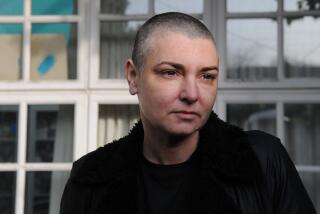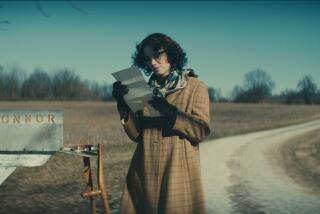Book review: ‘Ghost Light’ by Joseph O’Connor
- Share via
Joseph O’Connor — brother of Sinéad O’Connor — published his first novel, “Cowboys and Indians,” in 1991 and immediately saw it shortlisted for the Whitbread Prize. Since then O’Connor has published a series of novels, including “Star of the Sea,” which was awarded France’s Prix Millepages and Italy’s Premio Acerbi. O’Connor’s most recent novel, “Ghost Light,” adds to this impressive résumé and signals the end of a 10-year project to write three books set in “forgotten corners of the Irish past.”
This particular venture into Ireland’s past features Molly Allgood (stage name, Maire O’Neill), who was engaged to John Millington Synge at the time of his death in 1909. Allgood was, as W.B. Yeats put it in his 1923 Nobel lecture, a player of genius. Allgood was also, crucially, Synge’s teenage muse for Pegeen Mike in “The Playboy of the Western World” and his lead in “Deirdre of the Sorrows.”
These few biographical details aside, no one really knows what went on between Synge and Molly during their engagement or what became of Allgood in later life. As O’Connor himself says, “Most events in this book never happened at all.” And so we come to what is perhaps O’Connor’s final forgotten corner: an imaginary account of Allgood’s closing days — day — compliments of a syncretistic mix of fictive letters, well-hewn episodes, occasional fragments and timely reminiscences.
When we first meet Molly, it is 1952, and she is, at age 67, on the way out. Living in a dreadful room in London, she has twice married, endured the death of a son during World War II and is about to take her first “medicinal” sip of the day — it is 6:43 a.m. The same Molly takes no prisoners when it comes to thinking about her old cronies, back home, and how they have written her off as a loser: “I am on the BBC, I’m not gone yet. You envious creeping huers. My name is Molly Allgood. Kiss my Mary Street arse.”
At other times Molly — O’Connor — entertains some choice memories of famous Irish writers to provide a little comic relief. A particular favorite is Yeats, who, at one point in the proceedings (Yeats’ poem “When You Are Old” figures as a leitmotif throughout), gives the Abbey Theatre’s cast a real dressing down because they lack a certain respect for Synge, someone Yeats ranks alongside Aeschylus and Ibsen.
Here is Yeats in full rant: “And when you are old and full of weariness, the best any of you will have to recollect of your miserable, futile huckstering existences is that once you were in the presence of a Titan.” What follows this bit of senatorial palaver is the Titan’s attempt to break in — “I say, Yeats, old man, I think you’re being a little too —” only to be met with peremptory dismissal: “Be quiet, Synge!”
James Joyce, another canonical presence, is treated with far more respect than Yeats. No surprise, then, that O’Connor hosts a dinner scene much like Joyce’s Christmas get-together in “A Portrait of the Artist as a Young Man.” No surprise, either, that when Molly reminisces about Dossie Wright and J. Seamus Shannon, her fantasies parallel those of Molly Bloom about the priapic Blazes Boyland in “Ulysses.”
“Ghost Light” not only provides us with a who’s who of Irish writing (Brian Moore’s “The Lonely Passion of Judith Hearne” included), but also represents a fond farewell to Ireland’s “hidden corners” since O’Connor plans, as he put it in a recent Irish Times interview, to set his next novel outside the motherland — to try and become what Flann O’Brien, who failed to raise his eyes from Ireland, could have become if he had ventured further afield: a “wonderful, internationally important novelist.”
McElroy teaches in the University Writing Program at UC Davis.
More to Read
Sign up for our Book Club newsletter
Get the latest news, events and more from the Los Angeles Times Book Club, and help us get L.A. reading and talking.
You may occasionally receive promotional content from the Los Angeles Times.










